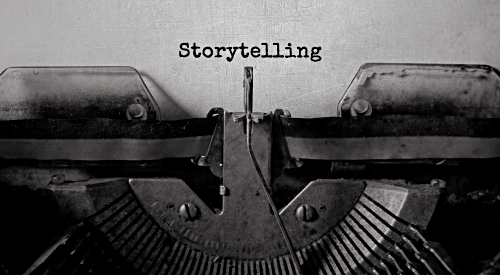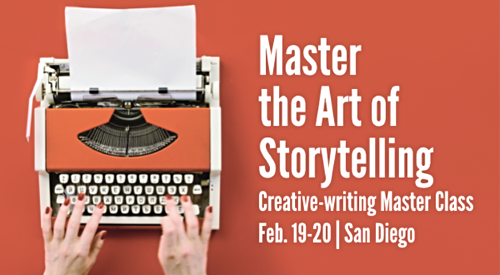‘Whoever tells the best story wins’
Here’s an argument for storytelling, if I’ve ever heard one …
In a trial to determine whether the defendant, Johnson, was guilty of stabbing another man, Caldwell, to death in a barroom fight, it didn’t matter what evidence lawyers presented as much as how they presented it.

When prosecutors presented their witnesses in chronological, story order, but the defense’s evidence was out of order, 78% of jurors voted to convict.
But when Johnson’s defense team presented its evidence in story order, but the prosecution presented theirs willy-nilly, 69% of jurors voted to acquit — even though the evidence itself was exactly the same in each case.
“Whoever tells the best story wins,” says lawyer and former President John Quincy Adams in the movie Amistad. This research by Nancy Pennington of the University of Chicago, and Reid Hastie of Northwestern University adds substance to that statement.
Why is storytelling important? Because stories:
1. Grab and keep audience attention.
Each day, Americans face the data equivalent of 174 newspapers, ads included.
In this environment, communicators must work hard to grab and keep our audience members’ attention. One way to do that is through storytelling.
Consider NPR’s “driveway moments” — stories that are so interesting, they compel their listeners’ rapt attention, no matter what else is competing for their time. The ice cream may be melting, the babysitter may be waiting … but NPR has your attention until the very end of the piece.
2. Make messages easier to understand.
Stories are concrete. They transform abstract concepts — such as the benefits of your products or services — into real-life, human examples that readers can wrap their minds around. That’s one reason Daniel Pink believes that storytellers will rule the future.
Stories are easier to understand than piles of facts, as the Pennington-Hastie research shows.
When people are confused by information, they turn to stories. When readers face complicated financial data, for instance, they often make up scenarios to help them “see” the topic in action, according to a study conducted at Carnegie Mellon University. That helps readers understand the facts.
3. Increase credibility.
Call it the Peer Principle of Persuasion: Our audience members believe that if it worked for someone else, it will work for them.
4. Help people remember longer.
Readers’ brains light up as they read stories:
- One group of neurons fire to provide the story’s sense of space and movement (a careening car on a narrow road, for instance).
- Motor neurons flash when the characters grasp objects.
- Neurons involved in eye movement activate when characters navigate their world.
- Yet another group on neurons ramps up when you read about the characters’ goals.
Or so say Jeffrey Zacks and his team of psychologists at Washington University in St. Louis. They used a brain scanner to see which regions lit up as participants read different parts of a story.
That’s one reason storytelling increases the chances that readers will:
- Remember what they’ve read
- Use the information
- Make good decisions based on the information
Stories were more effective than charts, tables, graphs or simple assertions, according to research by University of Oregon professors Judith Hibbard and Ellen Peters.
5. Go viral.
Stories are more likely to get shared, according to Keith Quesenberry, a lecturer at the Center for Leadership Education at Johns Hopkins University.
He correctly predicted Budweiser’s 2014 Super Bowl commercial “Puppy Love” would win the ratings because it had five plot points and told a full story. (Not to mention: puppies!) And sure enough, “Puppy Love” won a USA Today poll of the most popular Super Bowl ads of the year.
And sharing? A Budweiser spokesman told The New York Times the company saw “a marked improvement in share trends” after the puppy commercial aired.
6. Move people to act.
The same chemical that floods our bodies during orgasm — oxytocin — also kicks in when we’re reading stories.
Oxytocin, which is produced in the brain, plays a huge role in building trust and empathy and in bonding two creatures together: Prairie voles, for example, are among nature’s most monogamous species; they also produce oxytocin in spades.
When that love drug floods our brains as we read stories, we become more empathetic toward our fellow man — and more receptive to information. And that, according to Paul Zak, a professor of economics, psychology and management at Claremont Graduate University, makes us more likely to give to charitable campaigns.
Why storytelling?
Storytelling is “the most powerful form of human communication,” according to Peg Neuhauser, author of Corporate Legends and Lore.
Are you crafting stories that get your audience members to pay attention, understand, remember and act on your messages?
Ad giant David Ogilvy famously said, “Nobody ever sold anybody anything by boring them to death.” Most organizations seem to have missed that memo!
But at Master the Art of Storytelling — a two-day creative-writing workshop on Feb. 19-20, 2019, in San Diego — you’ll learn how to craft stories that draw readers in and move them to act.
|
